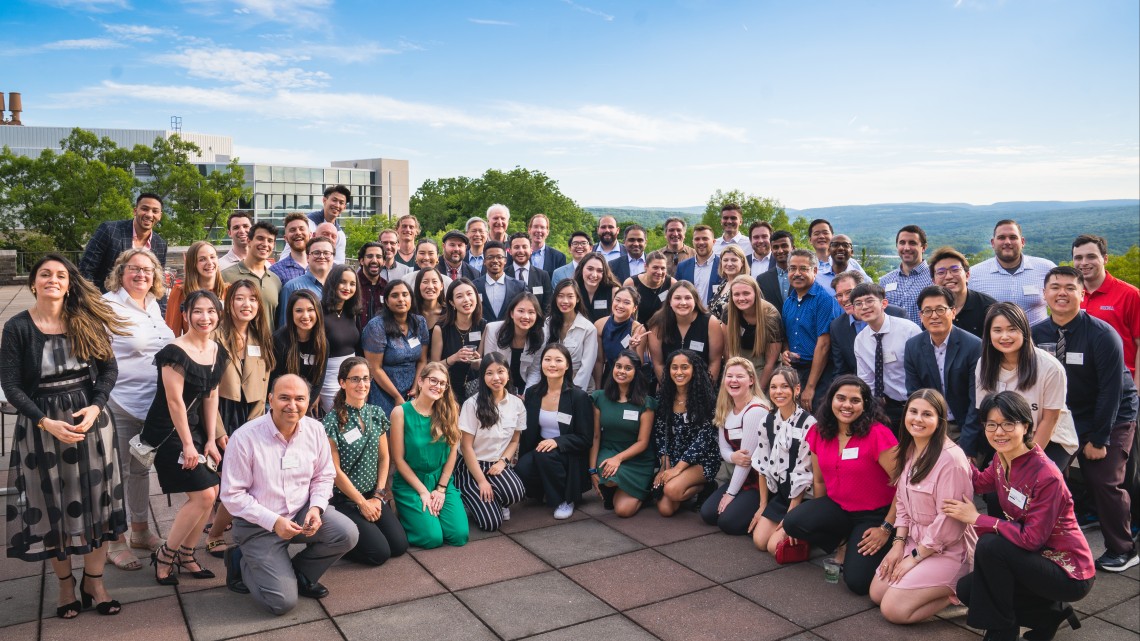
News directly from Cornell's colleges and centers
Data and Gorges: The Inaugural MSBA class completes first residency in Ithaca
By Sarah Thompson
To better equip leaders for a world where data-driven decision making is ubiquitous, Cornell’s Samuel Curtis Johnson Graduate School of Management welcomed its first class of students working towards an accelerated Master of Science in Business Analytics (MSBA) degree. 56 students joined their professors and classmates in person on the Ithaca, NY campus June 13-17 for intensive workshops and team building during their first residency.
For many early- to mid- career professionals, pursuing a graduate degree is a valuable way to launch their career into a new phase; today, regardless of industry, that new phase will likely deal with data. As companies collect terabytes of data daily, they need professionals who can harness it to create automated models for guiding business decisions. Many motivated working professionals are eager to fill the void, but full-time graduate business programs at top-tier universities require students to put their careers on hold.
“The Cornell MSBA is exciting because working professionals can take coursework at their own pace without leaving their jobs,” says Vishal Gaur, program director and Emerson Professor of Manufacturing Management at Johnson. “Students can relate what they're learning directly to their organizations, which translates into a more effective educational experience and better skill development.”
The part-time program takes place over 16 months, 19 online courses, and two weeklong summer residencies. In addition to providing a foundation in business and creative problem-solving, courses give students rigorous training in using analytics tools such as Python, R, and Structured Query Language (SQL) to manage data and apply optimization and statistical models. Students apply those new skills to complete a final capstone project solving a real-world problem in their chosen concentration. Capstone presentations take place at Cornell Tech in New York City during students’ second and final summer residency.
The applied, technical nature of Cornell’s MSBA was an important factor in Alfonso Vergara’s choice to apply. Vergara, a senior procurement specialist for Syntegon, an international packaging company, had spent a decade observing his company collect increasing amounts of data and he realized he lacked the basic programming skills needed to leverage it.
“I've only been studying one month but am already using SQL with my workplace databases,” Vergara says. “The speed with which you're able to apply your knowledge is incredible.”
The online course structure and quality also impressed Vergara’s classmate Amanda Yuan Proctor, MSBA ’23. Proctor, a manager of gas compliance at Consolidated Edison Company of New York, wanted a master's program that combined business knowledge with data analytics to complement her work experience and undergraduate engineering degree. She also needed a flexible program to fit her schedule as a full-time working mother. But Proctor wasn’t familiar with virtual learning and was surprised to find Cornell’s online content so well organized.
“They really mastered the art of transferring knowledge with short spurts of engaging content, prompts, and immediate feedback on the concepts,” Proctor says. “It was the most effective use of my time and really helped me absorb the information.”
Like Cornell’s full-time residential MBA program, MSBA classes are kept small to foster an environment centered on teamwork and mentorship. But remote learning adds a challenging twist to that model; the Cornell MSBA summer residencies are a powerful solution. Proctor says the program format—one month working together online to start the program followed by an in-person residency—created a valuable team bonding experience and gave her a real connection to Cornell, her professors, and classmates.
“The campus residency was the cherry on top,” Proctor says.
Gaur has high expectations for this first MSBA class, within which he says the coalition of ideas is incredible. Because data is critical for addressing the world’s most pressing challenges, Gaur says MSBA graduates have huge potential to do good in the world as part of Cornell's global alumni network.
“Our program doesn’t only provide technical and business expertise,” says Gaur. “We help graduates understand the vast potential and very real limitations of data so they can become ethical problem solvers for the future.”
Media Contact
Get Cornell news delivered right to your inbox.
Subscribe
